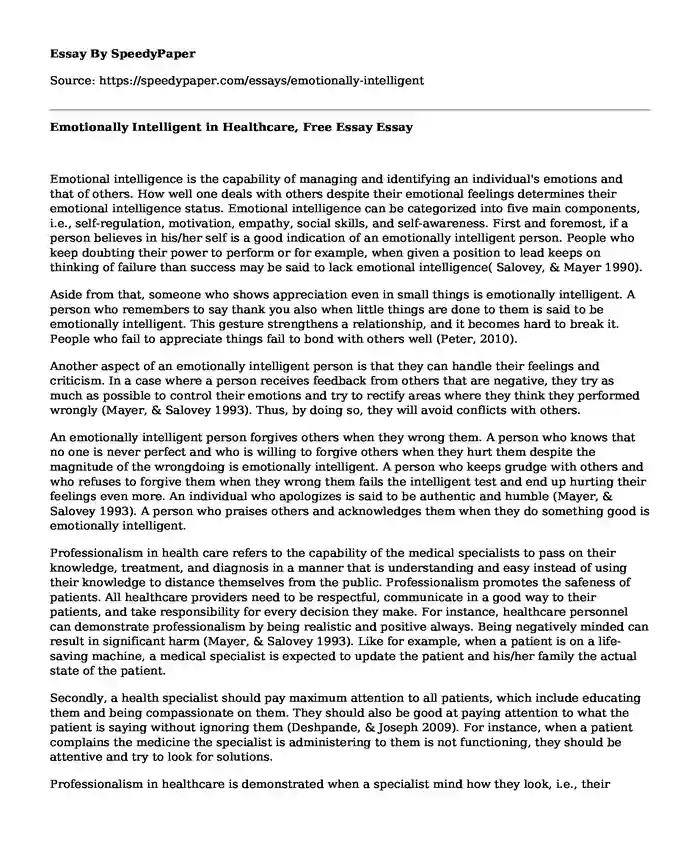
| Type of paper: | Essay |
| Categories: | Health and Social Care Emotional intelligence |
| Pages: | 3 |
| Wordcount: | 781 words |
Emotional intelligence is the capability of managing and identifying an individual's emotions and that of others. How well one deals with others despite their emotional feelings determines their emotional intelligence status. Emotional intelligence can be categorized into five main components, i.e., self-regulation, motivation, empathy, social skills, and self-awareness. First and foremost, if a person believes in his/her self is a good indication of an emotionally intelligent person. People who keep doubting their power to perform or for example, when given a position to lead keeps on thinking of failure than success may be said to lack emotional intelligence( Salovey, & Mayer 1990).
Aside from that, someone who shows appreciation even in small things is emotionally intelligent. A person who remembers to say thank you also when little things are done to them is said to be emotionally intelligent. This gesture strengthens a relationship, and it becomes hard to break it. People who fail to appreciate things fail to bond with others well (Peter, 2010).
Another aspect of an emotionally intelligent person is that they can handle their feelings and criticism. In a case where a person receives feedback from others that are negative, they try as much as possible to control their emotions and try to rectify areas where they think they performed wrongly (Mayer, & Salovey 1993). Thus, by doing so, they will avoid conflicts with others.
An emotionally intelligent person forgives others when they wrong them. A person who knows that no one is never perfect and who is willing to forgive others when they hurt them despite the magnitude of the wrongdoing is emotionally intelligent. A person who keeps grudge with others and who refuses to forgive them when they wrong them fails the intelligent test and end up hurting their feelings even more. An individual who apologizes is said to be authentic and humble (Mayer, & Salovey 1993). A person who praises others and acknowledges them when they do something good is emotionally intelligent.
Professionalism in health care refers to the capability of the medical specialists to pass on their knowledge, treatment, and diagnosis in a manner that is understanding and easy instead of using their knowledge to distance themselves from the public. Professionalism promotes the safeness of patients. All healthcare providers need to be respectful, communicate in a good way to their patients, and take responsibility for every decision they make. For instance, healthcare personnel can demonstrate professionalism by being realistic and positive always. Being negatively minded can result in significant harm (Mayer, & Salovey 1993). Like for example, when a patient is on a life-saving machine, a medical specialist is expected to update the patient and his/her family the actual state of the patient.
Secondly, a health specialist should pay maximum attention to all patients, which include educating them and being compassionate on them. They should also be good at paying attention to what the patient is saying without ignoring them (Deshpande, & Joseph 2009). For instance, when a patient complains the medicine the specialist is administering to them is not functioning, they should be attentive and try to look for solutions.
Professionalism in healthcare is demonstrated when a specialist mind how they look, i.e., their appearance. Their first appearance matters a lot and may make someone respect them or disrespect them. For example, when a female nurse attends to an old man wearing a dress that exposes most of her body, the old man might have a wrong perspective of the nurse.
All healthcare professionals should be accountable for their actions and have a helping heart (Deshpande, & Joseph 2009). In a case where a specialist gives a wrong prescription to a patient to a patient, and the patient dies, he/she should take full accountability for his/her action.
References
Deshpande, S. P., & Joseph, J. (2009). Impact of emotional intelligence, ethical climate, and behavior of peers on the ethical behavior of nurses. Journal of Business Ethics, 85(3), 403. Retrieved from https://www.researchgate.net/profile/Satish_Deshpande/publication/225395978_Impact_of_Emotional_Intelligence_Ethical_Climate_and_Behavior_of_Peers_on_Ethical_Behavior_of_Nurses/links/54eb2ccf0cf27a6de1174d43.pdf
Johnson, C. E. (2018). Organizational ethics: A practical approach. Sage Publications. Retrieved from https://study.sagepub.com/node/22762/help
Mayer, J. D., & Salovey, P. (1993). The intelligence of emotional intelligence. Retrieved from https://eclass.teicrete.gr/modules/document/file.php/IP-ERLSF116/Mayer-Salovey.1993-libre.pdf
Peter, P. C. (2010). Emotional intelligence. Wiley International Encyclopedia of Marketing. Retrieved from https://scholars.unh.edu/cgi/viewcontent.cgi?article=1007&context=personality_lab
Salovey, P., & Mayer, J. D. (1990). Emotional intelligence. Imagination, cognition, and personality, 9(3), 185-211. Retrieved from http://citeseerx.ist.psu.edu/viewdoc/download?doi=10.1.1.385.4383&rep=rep1&type=pdf
Cite this page
Emotionally Intelligent in Healthcare, Free Essay. (2022, Feb 17). Retrieved from https://speedypaper.com/essays/emotionally-intelligent
Request Removal
If you are the original author of this essay and no longer wish to have it published on the SpeedyPaper website, please click below to request its removal:
- Free Essay on Whether Blended Learning Accelerate Student Growth
- Free Essay Example on Ancestor Worship
- Free Essay Example on Freedom of Expression
- Essay Sample on Travel and Tourism: Past, Present and Future
- Child Development Essay Example
- Nursing Essay Outline Example: Treatment of Patients with Mental Health Problems
- Essay Example: Why do we have Troubles Fixing HealthCare Systems
Popular categories




